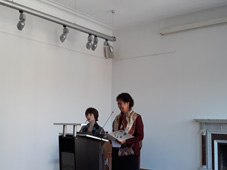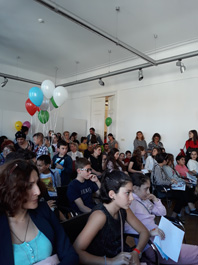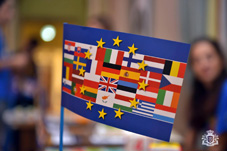
European Day of Language celebrated at Goethe Institute in Georgia
By Mariam Chanishvili
Wednesday, October 3
Every year, Europe celebrates its linguistic diversity at the end of September. Numerous cultural institutes take part in the European Day of Language.
The general objectives of the European Day of Languages are to alert the public to the importance of language learning and intercultural understanding, promote the rich linguistic and cultural diversity of Europe and encourage lifelong language learning in and out of school.
This year, Goethe Institute in Georgia organized an event on September 30 in order to celebrate the European Day of Languages.
French, Portuguese, English, Spanish and other language desks were presented during the event, giving proper information on exchange programs and language centers.
The event was officially opened by the Deputy Minister of Education, Science, Culture and Sport of Georgia, Aleksandre Tevzadze, the President of the European Union National Institutes for Culture (EUNIC) in Georgia, Barbara Von Munchhausen and the Head of the Council of Europe office in Georgia, Cristian Urse.
Barbara Von Munchhausen thanked the Ministry of Education, Science, Culture and Sport and the EU Delegation in Georgia for the support.
Aleksandre Tevzadze noted that the objective of the Ministry envisages two or more languages taught in Georgian schools, which is very important for the youth educational development.
“It is a great pleasure to meet the new people including the youth and celebrate the European Language Day together,” he said.
“Every new language opens a new door for learners. Popularizing cultural diversity through languages is another possibility,” said Cristian Urse.
Ambassador of the European Union to Georgia, Carl Hartzell also delivered the welcoming speech.
“We have 24 official languages in European Union. Three European languages (English, Spanish, and Portuguese) are among the top ten spoken languages around the world. Learning language’s will give you a chance to make new discoveries, broaden your mind, make new friends and be successful in business,” Hartzell noted.
The event was supported by the Ministry of Education, Science, Culture and Sport of Georgia and the EU Delegation in Georgia.
The program dedicated to the European Day of Languages was prepared by Goethe Institute and featured various competitions, workshops and many other entertaining activities, in which students from the age group of 8 to 18 had a chance to participate.
This year’s special guest of the event was psychologist Tamar Gagoshidze, who held a public lecture for the parents on the role of motivation in the teaching process and the importance of studying foreign language at the right age and necessary preconditions.
The art therapy workshop, where participants had a chance to create art samples painted on textiles by famous European artists and create their own notebooks.
The European Union National Institutes for Culture (EUNIC) is a network of European national institutes of culture and national bodies engaged in cultural and related activities beyond their national borders.
The European Day of Languages is supported and coordinated by the European Centre for Modern Languages of the Council of Europe. The Council of Europe includes 47 member states, 28 of which are members of the European Union.
Europe is rich in languages - there are over 200 European languages and many more spoken by citizens whose family origin is from other continents.
Language learning brings benefits to young and old – one is never too old to learn a language and to enjoy the opportunities it opens up. Even if one only knows a few words of the language of the country that they visit, this enables them to make new friends and contacts.



